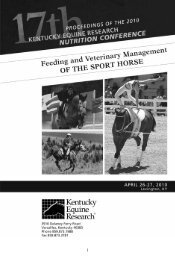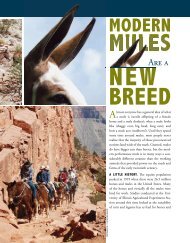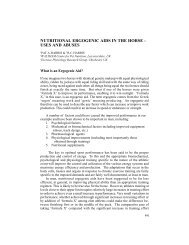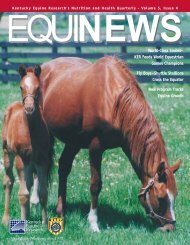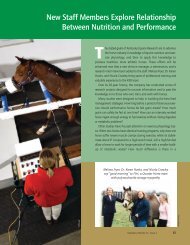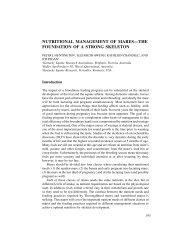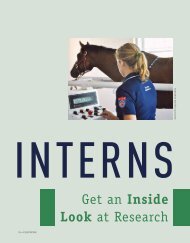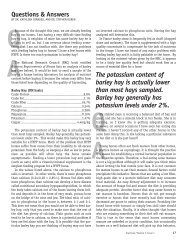HYPP: Diet Makes a Difference - Morgan Equine Veterinary ...
HYPP: Diet Makes a Difference - Morgan Equine Veterinary ...
HYPP: Diet Makes a Difference - Morgan Equine Veterinary ...
- No tags were found...
Create successful ePaper yourself
Turn your PDF publications into a flip-book with our unique Google optimized e-Paper software.
Mark Llewellynappropriate for horses that are not sensitive tostarch. If calories must be added and starch-ladenfeeds are not an option, calorie-dense vegetableoils are safe.Salt and water. Salt and water are critical foraffected horses. A lack of either reduces urination,which is how the horse rids superfluous potassiumfrom the body. A white salt block is best.Supplements. Read carefully the ingredient listsof any supplements intended for an <strong>HYPP</strong> horse.Most commercial electrolytes are unsuitable forthese horses as they contain high levels of potassium.If the label does not reveal ingredients or aguaranteed analysis, contact the manufacturer toget the information.Because of Impressive’s incredible prepotency, he was often crossed with Appaloosamares. Before purchasing a Quarter Horse, Appaloosa or Paint with Impressive in itspedigree, be sure to ask about the horse’s <strong>HYPP</strong> status.ing. Your local feed store may also be able to help youwith this service.Concentrates. Most commercially prepared sweet andpelleted feeds are a no-no for <strong>HYPP</strong>-positive horsesbecause they contain molasses. According to NutrientRequirements of Horses, molasses often possesses as muchas 6% potassium. Soybean meal, far and away the primarysource of protein in sweet and pelleted feeds, is also richin potassium.If textured or pelleted feeds are stricken from the menu,what’s left? Plain oats are the most popular grain fed tohorses and represent a low-potassium option. Oats areMedicationIn addition to strict control of diet, the administrationof acetazolamide has been recommended for<strong>HYPP</strong>-positive horse. Acetazolamide is a diuretic often recommendedby veterinarians, especially for young<strong>HYPP</strong>-positive horses being fed high-protein (and oftenhigh-potassium) diets to promote growth. The medicationstabilizes blood glucose and potassium by stimulatinginsulin excretion.It’s not unusual for horses to be maintained on the medicationfor long periods of time. Many halter horses continueto be fed pure alfalfa hay while simultaneously receiving thismedication daily. Breed registries differ in their restrictionson the use of acetazolamide during competitions.ExerciseAQHA’s Position on <strong>HYPP</strong>The American Quarter Horse Association (AQHA)classifies <strong>HYPP</strong> as a genetic defect. Beginning in1998, the association included this statement onthe registration certificates of horses that tracedto Impressive: “This horse has an ancestor knownto carry <strong>HYPP</strong>, designated under AQHA rules as agenetic defect. AQHA recommends testing to confirmpresence or absence of this gene.” If theowner chooses to test the horse and the testreveals a negative finding, the above statement isreplaced by “<strong>HYPP</strong> N/N” on the registration certificate.Mandatory testing for <strong>HYPP</strong> is requiredwith parentage verification.In nutrition and exercise physiology circles, it’s wellknown that exercise increases potassium levels in theblood. Logic would dictate, therefore, that exercise wouldincrease the likelihood of an <strong>HYPP</strong> attack. The opposite hasproven true. A regular exercise schedule is advised. Whenthe horse is not exercised under saddle or in harness, heshould have access to turnout that provides low-potassiumforage, salt, water, and adequate shelter. Stall confinementis often contraindicated for horses with <strong>HYPP</strong>.The Future of <strong>HYPP</strong>-Positive HorsesResponsible breeding is the key to reducing the incidenceof <strong>HYPP</strong> in the stock-horse population. Some horsemen arereluctant to eradicate <strong>HYPP</strong>-positive horses from theirbreeding programs because they often possess the veryqualities that garner not only championship ribbons butglory. But too often that glory comes at a steep price.<strong>Equine</strong>ws/Volume 9, Issue 1 9



